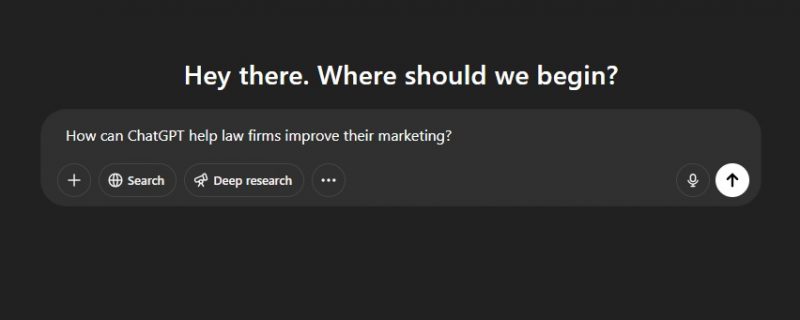
I’m going to go out on a limb here: I believe that generative AI is a more transformative moment for legal marketing than the advent of the internet itself. Hear me out. As digital marketing has evolved, artificial intelligence tools like ChatGPT, Claude, and Gemini are transforming how law firms attract and engage potential clients. This breakthrough technology offers unprecedented opportunities for legal marketers and savvy in-house teams—but also comes with important considerations.
This guide explores how law firms can leverage ChatGPT marketing, examining both the advantages and potential pitfalls.
In case, perhaps, you have been living in a bubble inside a Faraday cage which is itself inside a cave, ChatGPT is an advanced artificial intelligence language model developed by OpenAI. It generates human-like text based on prompts it receives, capable of writing content, answering questions, and simulating conversations with remarkable fluency. These “prompts” are analogous to search queries performed on “traditional” search engines.
For legal marketers, ChatGPT represents a powerful new tool that can streamline content creation, enhance client engagement, and provide data-driven insights—potentially transforming your firm’s digital marketing strategy.
Creating consistent, high-quality content has long been a challenge for busy law firms. ChatGPT can dramatically accelerate this process:
The key advantage here is consistency. ChatGPT never experiences writer’s block or burnout, allowing firms to maintain a steady publishing schedule that builds audience trust and improves SEO performance.
ChatGPT can significantly enhance your website’s effectiveness:
ChatGPT can transform how potential clients interact with your firm:
ChatGPT can help analyze competitor marketing strategies:
Despite its benefits, ChatGPT presents several challenges for legal marketers:
ChatGPT can occasionally generate incorrect information or outdated legal interpretations. A 2023 Stanford Law study found that AI-generated legal content had an 8-12% error rate when discussing nuanced or rapidly evolving areas of law.
Risk Mitigation Strategy: Implement a strict review protocol where all AI-generated content undergoes expert legal review before publication. This hybrid approach maintains efficiency while ensuring accuracy.
While ChatGPT can be guided to adopt a particular tone, maintaining consistent brand voice can be challenging without proper prompting and editing. According to an ALM Intelligence survey, 57% of firms reported challenges maintaining their unique voice when scaling AI content production.
Risk Mitigation Strategy: Create detailed brand guidelines and prompt templates that consistently communicate your firm’s voice, style, and values. Many successful implementations begin with human-written examples that serve as stylistic templates.
Legal marketing faces strict regulatory requirements that vary by jurisdiction. Bar associations in several states have issued guidance on attorney advertising that must be considered when using AI-generated content.
Risk Mitigation Strategy: Develop jurisdiction-specific review checklists that ensure all content meets applicable ethics rules. Consulting with ethics counsel on your AI content strategy can prevent costly compliance issues.
When using third-party AI platforms, client information could potentially be processed in ways that raise confidentiality questions. This is particularly relevant when using ChatGPT for client intake or lead generation.
Risk Mitigation Strategy: Use private instances or enterprise versions of AI tools with appropriate data processing agreements. Clearly disclose how client information submitted through AI channels will be used and protected.
To maximize ChatGPT’s marketing potential while minimizing risks, consider these implementation strategies:
Start with Low-Risk Applications
Begin your AI marketing journey with content that carries minimal risk, such as:
These applications allow your team to develop AI competency before moving to more sensitive applications.
Develop Clear AI Policies
Create explicit guidelines governing:
Cooley LLP’s transparent AI policy resulted in 94% client approval ratings and has become a model in the industry.
Investment in Training
Effective AI marketing requires specialized skills. Invest in training for:
Firms that invested in formal AI training for marketing staff reported 68% higher satisfaction with their AI implementations according to a 2023 Legal Marketing Association survey.
Monitor Results and Adapt
Track key performance indicators to measure AI marketing impact:
Successful firms use these metrics to continuously refine their AI marketing approach.
ChatGPT represents a transformative technology for legal marketing, offering unprecedented opportunities to scale content creation, enhance client engagement, and gain competitive insights. However, the technology must be implemented thoughtfully, with appropriate safeguards for accuracy, brand consistency, and ethical compliance.
The most successful law firm marketers approach AI as a powerful assistant rather than a replacement for human expertise. By combining ChatGPT’s efficiency with human strategic oversight, law firms can create marketing programs that are not only more productive but also more effective at connecting with the right clients.
I believe that for digital marketing agencies serving legal clients, developing expertise in AI-assisted legal marketing represents a significant opportunity to deliver enhanced value. Those who master the balance between technological innovation and the unique requirements of legal marketing will emerge as leaders in this rapidly evolving field.
Ready to maximize your marketing budget? Fill out the contact form or call us today for a complimentary consultation. We will listen to your story, work to define your business objectives, and recommend an approach to deliver maximum ROI for your firm.
By using this website, you consent to our use of cookies in accordance with our Cookie Policy. Cookies help us enhance your browsing experience and provide personalized content. If you do not agree to our use of cookies, please adjust your browser settings accordingly.